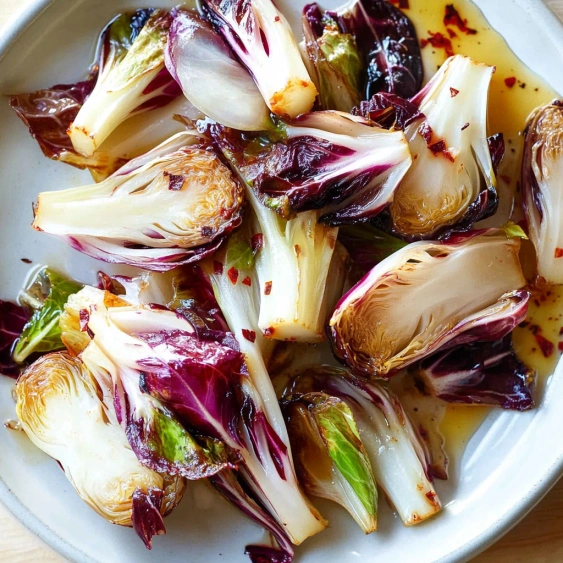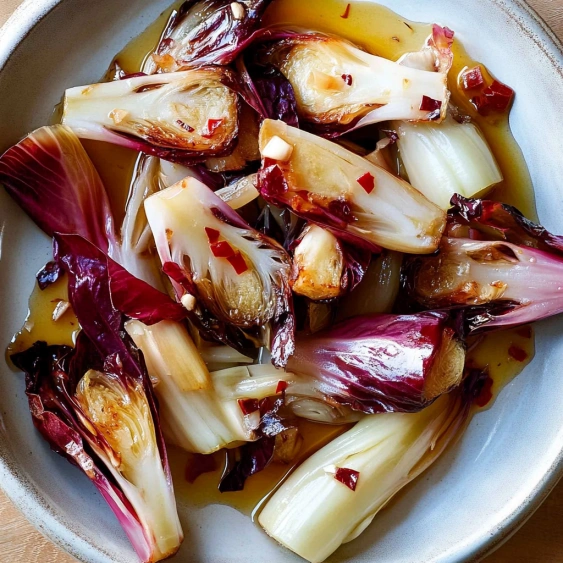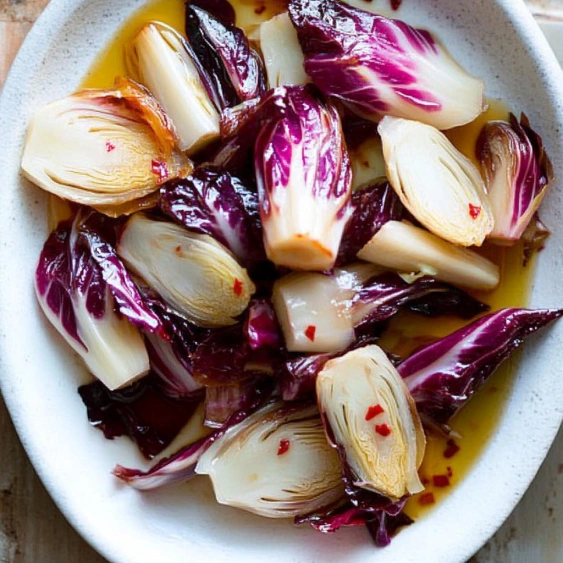 Pin it
Pin it
This tender-crisp sautéed endive and radicchio dish transforms bitter chicories into a vibrant side with just the right amount of heat from chile oil. The quick cooking method preserves texture while mellowing the natural bitterness that makes these greens so distinctive.
I first made this dish for a dinner party when I wanted something light yet impressive. The contrast between the slightly wilted and still-crisp portions of the chicories became an instant conversation starter at the table.
Ingredients
- Extra virgin olive oil: provides the essential base for sautéing while adding richness
- Mixed chicories: including endive and radicchio bring beautiful color and pleasantly bitter notes
- Smashed garlic cloves: infuse the oil with aromatic flavor without overpowering the greens
- Kosher salt: enhances the natural flavors and helps draw out excess moisture
- White balsamic vinegar: adds brightness and balances the bitter notes with subtle sweetness
- Flaky sea salt: creates little bursts of flavor when sprinkled before serving
- Chile oil: delivers customizable heat that complements the bitter greens perfectly
Step-by-Step Instructions
- Prepare The First Batch:
- Heat a generous tablespoon of olive oil in a large skillet over medium high heat until shimmering but not smoking. Add one smashed garlic clove to flavor the oil then quickly add one third of your chopped chicories along with a good pinch of salt. Allow to cook undisturbed for exactly 30 seconds to get some light caramelization on the parts touching the pan.
- Toss And Transfer:
- Using tongs gently toss the greens for another 10 to 20 seconds just until they begin to wilt slightly but still maintain some structure. Immediately transfer to your serving bowl before they become too soft. The variation in textures creates a more interesting eating experience.
- Repeat The Process:
- Add another tablespoon of oil to the pan and repeat with a fresh garlic clove and another third of your chicories. Maintain the same quick cooking technique focusing on preserving texture differences. Transfer to the serving bowl with the first batch.
- Complete The Final Batch:
- Repeat one last time with the remaining oil garlic and chicories following the same technique. This batching method ensures each portion of greens gets proper contact with the hot pan without overcrowding.
- Season And Finish:
- Gently toss all the sautéed chicories with two tablespoons of white balsamic vinegar. Taste and adjust by adding flaky sea salt and additional vinegar until the flavors are bright and well balanced. Drizzle with chile oil to taste or serve it on the side for guests to add according to their heat preference.
 Pin it
Pin it
The first time I served this at a family gathering my sister who normally avoids bitter greens took seconds and then asked for the recipe. The chile oil transformed what could have been ordinary sautéed greens into something memorable that even skeptics enjoyed.
Selecting The Best Chicories
When shopping for chicories look for heads that feel firm and heavy for their size. The leaves should appear crisp without browning or wilting at the edges. Endive should have tight pale yellow to white leaves while radicchio should display vibrant burgundy coloring. Both Belgian endive and Treviso radicchio work beautifully in this recipe but you can experiment with other varieties like escarole or frisée for different textures.
Making Your Own Chile Oil
Creating homemade chile oil elevates this dish significantly. Simply heat a cup of neutral oil like grapeseed to approximately 225°F then add two tablespoons of crushed red pepper flakes and remove from heat. Allow the mixture to steep for at least one hour before straining. For a more complex flavor add a smashed garlic clove a cinnamon stick and a bay leaf to the steeping oil. Store in an airtight container at room temperature for up to one month.
Perfect Pairings
These sautéed chicories complement rich main courses particularly well. Try serving alongside a grilled steak roasted chicken or pan seared fish. The bitterness and acidity cut through fatty proteins creating a balanced plate. For a complete vegetarian meal pair with creamy polenta and roasted mushrooms. The bitter greens also work wonderfully with aged cheeses like Parmigiano Reggiano or Pecorino Romano sprinkled over the top just before serving.
 Pin it
Pin it
Frequently Asked Questions
- → What are chicories?
Chicories are a family of leafy vegetables that include endive, radicchio, escarole, and frisée. They share a characteristic bitterness and are popular in Mediterranean cooking. Each variety offers different textures and degrees of bitterness, making them interesting to combine in dishes.
- → Can I make this dish ahead of time?
Yes, you can prepare this dish in advance and serve it at room temperature. The flavors actually develop nicely as it sits. Just add the chile oil right before serving for the freshest flavor and appearance.
- → What can I substitute for white balsamic vinegar?
If you don't have white balsamic vinegar, you can substitute with regular balsamic vinegar (though it will darken the dish), champagne vinegar, or white wine vinegar with a small touch of honey to replicate the mild sweetness.
- → What type of chile oil works best?
Any quality chile oil will work well. You can use commercial varieties like Chinese chile oil, Italian olio di peperoncino, or make your own by infusing olive oil with dried chiles. Adjust the amount based on your heat preference.
- → What protein pairs well with this dish?
This dish pairs beautifully with simply prepared proteins like grilled fish, roasted chicken, or pan-seared steak. The bitterness of the chicories and acidity from the vinegar help cut through rich meats.
- → Why are the chicories cooked in batches?
Cooking in batches prevents overcrowding the pan, which would cause the greens to steam rather than sauté. This method ensures some greens get slightly charred while others remain more crisp, creating an interesting textural contrast.
